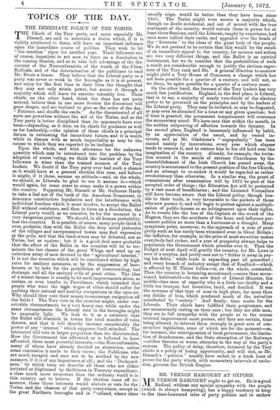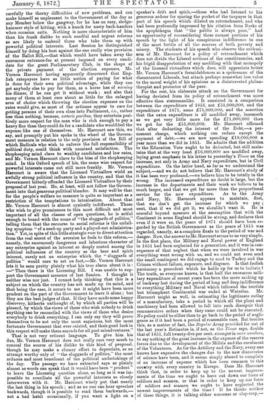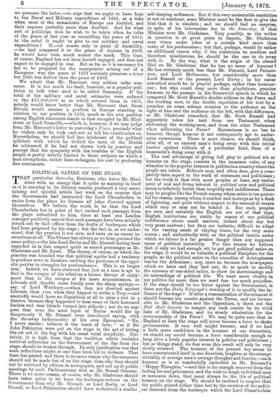MR. VERNON HARCOURT AT OXFORD.
Art VERNON HARCOURT ought to get on. He is a good Radical, without any special sympathy with the people (which is always hampering), has a happy tendency to keep to the time-honoured cries of party politics and to eschew carefully the thorny difficulties of new problems, and can make himself as unpleasant to the Government of the day as any Member below the gangway, for he has an easy, sledge- hammer style of hitting, with a knack for nasty, back-handers when occasion suits. Nothing is more characteristic of him than his frank dislike to such needful and urgent reforms as are likely to embroil those who take them up with powerful political interests. Last Session he distinguished himself by doing his best against the one really wise provision of the Ballot Bill,—that which would have taken away the enormous entrance-fee at present imposed on every candi- date for the great Parliamentary Club, in the shape of the private payment of the election expenses, Mr. Vernon Harcourt having apparently discovered that Eng- lish ratepayers have as little notion of paying for what is done for their own political advantage, while they can get anybody else to pay for them, as a horse has of earning his dinner, if he can get it without work ; and also that many of them at least care about as little for the enlarged area of choice which throwing the election expenses on the rates would give, as most of the artizans appear to care for getting persons of their own class into Parliament, i.e., rather less than nothing, because, cceteris paribus, they entertain posi- tively more respect for the man who is rich enough to pay a heavy fine than they could do for a candidate who would feel the expense like one of themselves. Mr. Harcourt saw this, we say, and promptly put his spoke in the wheel of the Govern- ment measure in relation to the only provision of the Bill of which Radicals who wish to enforce the full responsibility of political duty, could think with unmixed satisfaction. The shopkeeping mind clave to wealthy candidates and low rates, and Mr. Vernon Harcourt clave to the bias of the shopkeeping mind. In this Oxford speech of his, the same wise respect for powerful interests came out still more frankly. Mr. Vernon Harcourt is aware that the Licensed Victuallers wield an awfully strong political influence in the country, and that the Government bitterly offended the Licensed Victuallers by their proposal of last year. He, at least, will not follow the Govern- ment into that generous political blunder. It may well be that for the people's welfare no measure is quite so important as a restriction of the temptations to intoxication. About that Mr. Vernon Harcourt is almost cynically indifferent. Those who wish to give prominence to this most difficult and most important of all the classes of open questions, he is artful enough to brand with the name of "the sluggards of politics," telling them that the recourse to social reforms is the unfail- ing symptom "of a used-up party and a played-out administra- tion." Yet, in spite of this little strategic ruse to divert attention from the real secret of the aversion he feels to this reform,— namely, the enormously dangerous and laborious character of any enterprise against an interest so deeply rooted among the political influences of the country as the beer and spirit interest, surely not an enterprise which the " sluggards of politics " would care to set on foot,—Mr. Vernon. Harcourt lets it be seen pretty plainly what his true alarm about it is : —" Then there is the Licensing Bill. I was unable to sup- port the Government measure of last Session. I thought it neither wise nor just. I cannot help thinking that this is a subject on which the country has not made up its mind, and that being the case, it occurs to me it might have been more prudent on the part of the Government to leave it alone ; but they are the best judges of that. If they have made some happy discovery, hitherto unthought of, by which all parties will be pleased, by which the views of those who wish nobody to drink anything can be reconciled with the views of those who desire everybody to drink everything, I can only say they will prove themselves to be not only the most sagacious, but the most fortunate Government that ever existed, and their good luck in this respect will make them amends for all past misadventures." That is not very reticent language. To give him his due, Mr. Vernon Harcourt does not really care very much to conceal the source of his dislike to this kind of proposal, though he may make a clumsy effort to depreciate, as an attempt worthy only of " the sluggards of politics," the most arduous and most beneficent of the political undertakings of the day. The passage we have extracted says as plainly almost as words can speak that it would have been " prudent " to leave the Licensing question alone, so long as it was im- possible to conciliate all the powerful interests so closely interwoven with it. Mr. Harcourt wisely put that nearly the last thing in his speech ; and as no one can hear speeches backwards, though it is possible to read them backwards,— not a bad habit occasionally, if you want a light on a
speaker's drift and spirit, those who had listened to his generous ardour for sparing the pocket of the taxpayer in that part of his speech which dilated on retrenchment, and who had been profoundly impressed by his citation from Burke of the apophthegm that "the public is always poor," had no opportunity of reconsidering these earnest portions of his speech by the light of his conspicuous indifference to one of the most fertile of all the sources of both poverty and misery. The students of his speech who observe the enthusi- asm of Mr. Harcourt for a policy of retrenchment which does not divide the Liberal sections of the constituencies, and his frigid disapprobation of any meddling with that monopoly of the licensed victuallers which does, will appreciate better Mr. Vernon Harcourt's formidableness as a spokesman of the discontented Liberals, but attach perhaps somewhat less value to the moral weight of his opinions as a disinterested philan- thropist and protector of the poor.
For the rest, his elaborate attack on the Government for having deviated from its policy of retrenchment was more effective than statesmanlike. It consisted in a comparison between the expenditure of 1851, not £51,000,000, and the expenditure of 1871, some £71,000,000, and the assertion that the extra expenditure is all muddled away, inasmuch as we get very little more for the £71,000,000 than we got for the £51,000,000. Mr. Harcourt affirmed that after deducting the interest of the Debt,—a per- manent charge, which nothing can reduce except the payment of debt,—we are now spending £19,000,000 a year more than we did in 1851. He admits that the addition to the Education Vote ought to be deducted, but still main- tains that at the very least £16,000,000 are muddled away, laying great emphasis in his letter to yesterday's Times on the increase, not only in Army and Navy expenditure, but in Civil expenditure. On the latter head, as far as we understand the subject,----and we do not believe that Mr. Harcourt's study of it has been very profound,—we believe him to be totally in the wrong. The increased expenditure no doubt is large, but the increase in the departments and their work we believe to be much larger, and that we get far more than the proportional service for the new expenditure. As to the Army and Navy, Mr. Harcourt appears to maintain, first, that we don't get the increase for which we pay ; next, that if we did get it, we shouldn't want it. He is scornful beyond measure at the assumption that with the Continent in arms England should be strong, and declares that even if it were so, the peace of 1871 should have been re- garded by the British Government as the peace of 1815 was regarded, namely, as a complete finale to the period of war and danger. Now, the answer to Mr. Harcourt seems to us very simple. In the first place, the Military and Naval power of England in 1851 had been neglected for a generation, and it was in con- sequence of that neglect that when we were involved in war everything went wrong with us, and we could not even send the small contingent we did engage to send to Turkey and the Crimea without failure, exposure, and disgrace. Is that foolish parsimony a precedent which he holds up for us to imitate I The truth, as everyone knows, is that half the enormous mili- tary expenditure of recent years has been the mere making up of backway lost during the period of long and deep indifference to everything Military and Naval which followed the terrible but triumphant Continental war ended at Waterloo. Mr. Harcourt might as well, in estimating the legitimate outlay
of a manufactory, take a period in which all the plant and machinery had been allowed to fall into such disrepair that remunerative orders when they came could not be executed.
No policy could be sillier than to go back to the period of negli- gence as if it had been a period of reasonable care. But besides
this, as a matter of fact, the Regular Army provided for out of the last year's Estimates is, if not, as the Times says, double that of 1851, full twenty-five per cent. stronger in mere numbers,
to say nothing of the great increase in the expense of the reserve forces due to the development of the Militia and the enrolment of the Volunteers. As for the Artillery and the Navy, every one knows how expensive the changes due to the new discoveries of science have been, and it seems simply absurd to complain of an increase of expense which has been common to this country with every country in Europe. Does Mr. Harcourt think that, in order to keep up to the newest improve- ments of the time we ought to have cut down our force of soldiers and seamen, or that in order to keep up our force of soldiers and seamen we ought to have neglected the newest improvements of the time ? If he thinks neither of these things, it is talking either nonsense or clap-trap,— we presume the latter,—to urge that we ought to have kept to the Naval and Military expenditure of 1851, at a time when most of the armaments of Europe are doubled, and their expense probably more than doubled. And for what sort of politician does he wish to be taken when he talks of the peace of last year as resembling the peace of 1815, in the relief it ought to give to our military and naval expenditure ? If,—of course only in point of durability, —he had compared it to the peace of Amiens in 1802, he would have been much nearer the mark. This time, of course, England has not been herself engaged, and does not expect to be engaged in war. But so far as it is necessary for her to be prepared for the emergencies arising out of a European war, the peace of 1871 certainly promises a truce but little less hollow than the peace of 1802.
We admit that Mr. Harcourt very seldom talks non- sense. It is too much his fault, however, as a popular poli- tician to talk what used to be called flummery. If the total of the military and naval estimates were reduced to the £15,000,000 or so which covered them in 1851, nobody would know better than Mr. Harcourt that Great Britain would assume a position in Europe standing in relation to our position in 1851, much as his own position among English statesmen stands to that' occupied by Mr. Glad- stone or Lord Granville,—which is, however, if we may judge from Mr. Harcourt's letter to yesterday's Times, precisely what he wishes, only he took care not to tell his constituents so. Nevertheless, we should feel less intolerant of the political syllabub with which he tickled the taste of the Druids he addressed, if he had not shown both by practice and precept that his sympathy with the troubles of the English people is pretty strictly limited to those subjects on which a man strengthens, rather than endangers, his seat by professing fine sentiments.












































 Previous page
Previous page